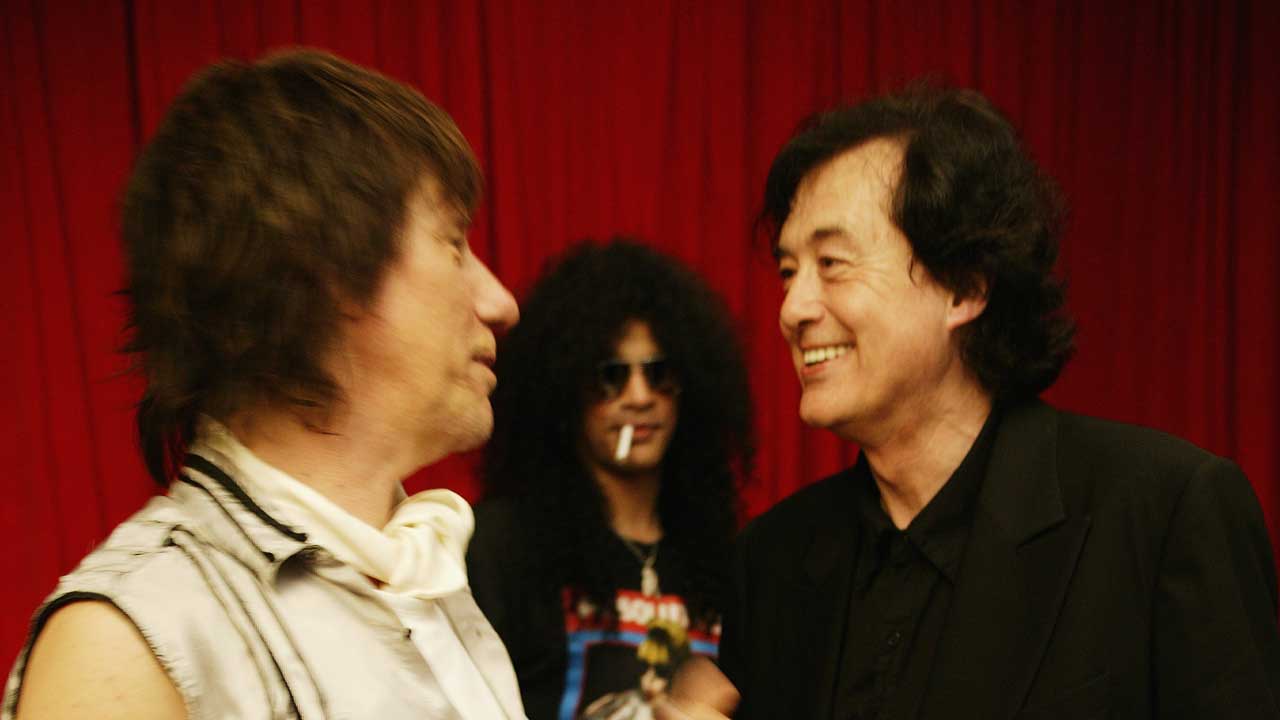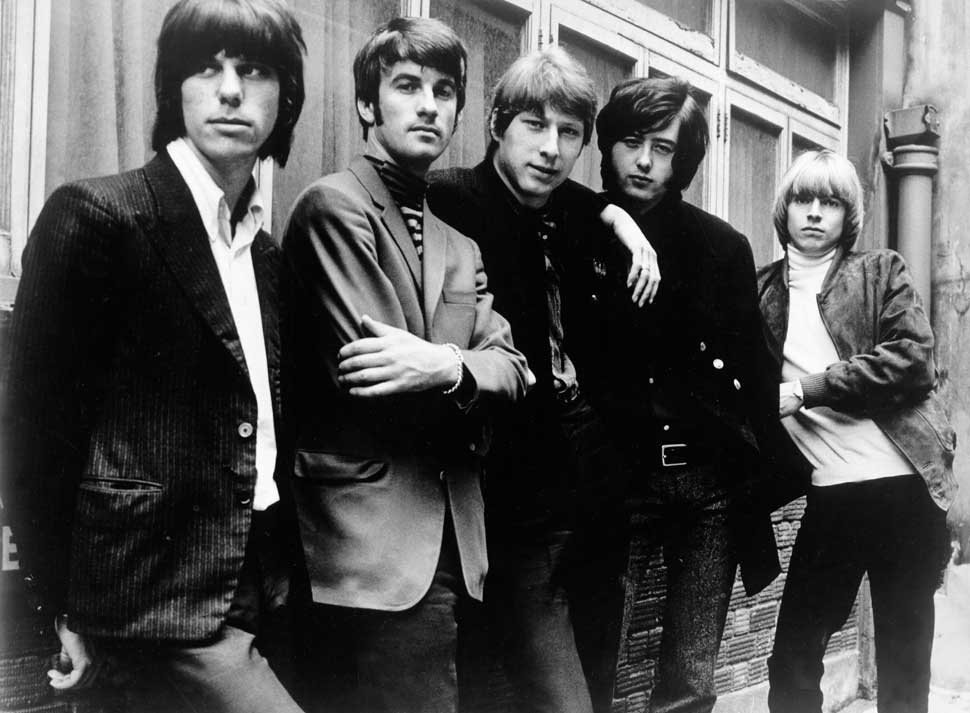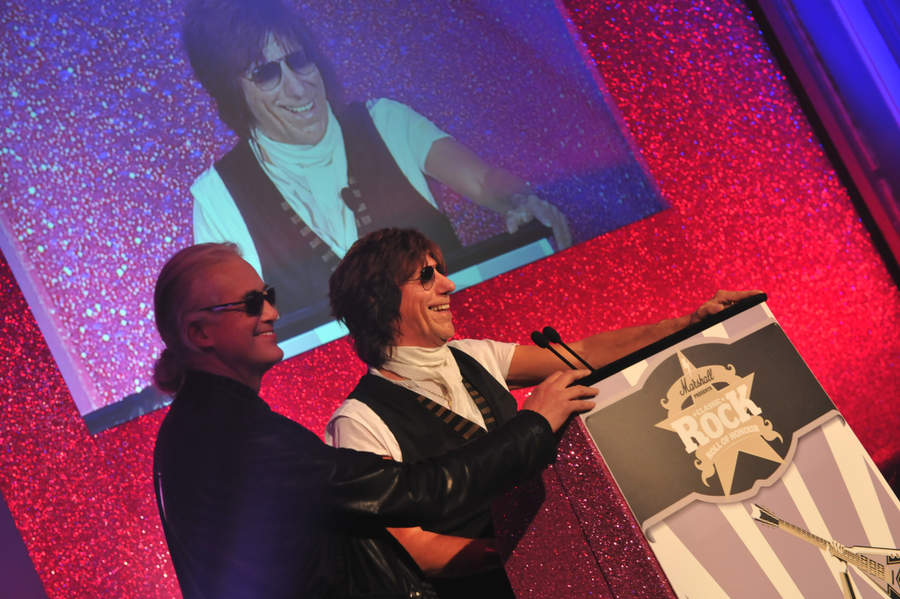
One day, maybe soon, geologists and hydrographers will perform studies in and around Surrey, England, to divine the magical compounds that have contributed to a strange and almost unbelievable phenomenon: Jimmy Page, Jeff Beck and Eric Clapton – three of the most terrifyingly talented guitarists the world has ever known – all grew up in this section of Britain within 10 minutes of one another.
The odds of such an occurrence taking place boggle the mind. Next thing you know, they’ll be telling us that something similar could happen in Liverpool. Two of these guitarists, Page and Beck, became acquainted with each other as teenagers – introduced in the early 60s by Beck’s sister.
“She was going to art school, and she told me about this guy at school who played a ‘funny guitar’ like mine,” recalled Beck. “And that was that. I got on a bus and went over to Jimmy’s house. I think we were about 16 or 17.”
The two young guitarists became fast friends, spending hours trading information and jamming together at Page’s house, learning all the latest Scotty Moore, James Burton, and Cliff Gallup licks. Using Jimmy’s two-track tape machine – a rarity in those days – they started making their own primitive recordings. And they got pretty good on those “funny guitars” – frighteningly good, in fact. Every note they played was unequivocal, brimming with force, passion and purpose.
It’s a fascinating tale, how these two players, by using the fundamentals they’d taught themselves and then by merely following their artistic impulses, came to throw off the dull, mannered strictures of 60s pop and pioneered guitar techniques and sonic advances that would revolutionise and define a new era of rock. Distortion, feedback, power chords, extended jamming, false harmonics, exotic tunings, and the controlled use of the whammy bar – all sprung from the minds and fingers of the two guitarists from Surrey.

Both of you started playing the electric guitar when it was still a relatively exotic and unusual instrument. What inspired you to pick it up?
Jeff Beck: I was galvanised by the rock’n’roll movies of the day, particularly The Girl Can’t Help It [1956], which featured performances by Eddie Cochran, Little Richard and Gene Vincent & The Blue Caps. That movie completely did me in, particularly seeing the Blue Caps who looked really dangerous. It started me wanting my own guitar.
I just remember being fascinated by the shape of the guitar and by the sounds that came out of it. In retrospect, I’m not sure why the guitar grabbed me so much, because it was really secondary: When the bands were playing it wasn’t like, ‘Here’s the guitar’. It was really just an appendage to these guys that were singing these great rock songs.
The guitar was initially presented more as just a fashion accessory, but a small group of us suddenly became more discriminating about who was actually playing and who was just hanging onto it. The mystery was, if Elvis wasn’t playing the lead guitar parts, then who was? And we’d go to music stores and start asking, ‘Who played on this record?’ and ‘Who’s on that?’
Jimmy Page: And then sitting down and really studying all of those records. It’s amazing to me now: the guitar parts were so subdued, but to me, I was so engrossed that they seemed very loud – right up there. Certain echoes and reverbs seemed earth shattering. But now when I listen to those same records, all of those effects are way in the background. But that’s how hard we studied them, and that’s how hungry we were. All of us – Eric, Jeff and all of our contemporaries – went through the same process. Those early rock records grabbed us hard…
Beck: …And threw us to the floor. [laughs]
It’s incredible to what degree you both were motivated – the lengths you went just to play electric guitar. What spurred you on?
Beck: There were a couple of factors. The electric guitar has never again had such a rich diversity of material that you could pull from. I never got fed up or bored back then because there was always someone doing something new. Between James Burton, Scotty Moore, Chet Atkins and Buddy Guy, there was plenty to keep you busy.
The other motivating factor was the collapse of rock’n’roll in ’59. Elvis was drafted, Buddy Holly was dead and there was no real danger anymore. Overnight, everybody was named Johnny This or Johnny That, and they were all singing this terrible V-neck-sweater music. So it was like, ‘What are you bastards doing with my music? I’m not going to have that taken away!’ So I think we decided we just wanted to take it back.
While the two of you first became prominent as members of The Yardbirds, you both had interesting careers before. Jimmy, before The Yardbirds and Led Zeppelin, you played with Neil Christian & The Crusaders and then went on to become a top session musician and producer. Could you give us a little sense of your life as a guitarist in the very early 60s?
Page: I was just a teenager when I played with Neil. We acquired a good reputation, but touring was very primitive and I found it very difficult at the time. I remember we were driving to a Liverpool club once and the van broke down and we had to hitchhike. By the time we arrived, we were so late that we only had time to play for 45 minutes. We didn’t have any money, so we ended up sleeping in this little room in the club, in the middle of the desk chairs and the fucking first-aid cabinet, and it was really cold.
Anyway, because of all the travelling and adverse conditions, I kept getting glandular fever. After a while, I thought, the hell with it. I decided to pack it in and go back to art college, which I really enjoyed. At the same time, I was only 18 and hadn’t really made my mind up about what I was going to do with my life.

While you were playing sessions, you still kept your finger in the outside world. Didn’t you procure some studio work for Jeff? And didn’t you produce a couple of post-Yardbirds Clapton sessions?
Page: Yes. At one point I was contracted to work as a staff producer for Immediate Records, and I used Jeff on a few sessions. It was a similar situation with Eric. We cut four songs with Eric, who was just starting to work with John Mayall, including Telephone Blues, which I think has one of his best solos.
Those sessions are almost the birthplace of the modern guitar sound. Clapton’s tone is so big and rich, especially for that time period.
Page: It was a funny session because during one of the songs Eric was using feedback, and there was this very straight engineer who thought we were crazy and was trying to pull down the faders. This was in ’66, and he had never heard a guitarist use feedback. I had to tell him to push up the faders and let me worry about it.
Weren’t you approached to join The Yardbirds after Eric left?
Page: Yeah, they actually asked me twice. They asked me before Eric had even left the band, because their manager, Georgio Gomelsky, wanted to get more commercial and Eric wanted to get more purist; Georgio wanted to force him out. Then they asked me again when Eric finally left. But I was still too nervous about getting ill while on the road, and I wasn’t quite sure about the politics with Eric, because we were friendly.
So I recommended Jeff, who I think was amazing as far as pushing The Yardbirds to the next level. His imagination on those Yardbirds albums is incredible. Unfortunately, soon after that, I started getting a lot of sessions that just weren’t fun. So when Jeff approached me later to join him in The Yardbirds I was anxious to do it. Still, I don’t regret the studio work, because it was excellent training.
Jeff, did you have any reservations about taking Clapton’s place in The Yardbirds?
Beck: Not for a second. I was playing in a very good band called The Tridents, and they were always raving about The Yardbirds. I had never really heard them, but they were always talking about Eric Clapton this, and Eric Clapton that. I can tell you, I was getting pretty tired of that adulation for someone else. I was like, ‘Fuck Eric Clapton, you know, I’m your guitarist.’
And then one day we were in this little store and there was a little transistor radio playing The Yardbirds’ version of Good Morning Little School Girl, with Eric on guitar. And I went: ‘Oh great, fantastic!’ But I didn’t really think it was all that impressive. So I got a little bit of courage and, the next thing you know, I’m in the bloody Yardbirds, facing Eric’s audience at the Marquee. I was a little nervous, but I also knew that it was the best break I was ever going to get.
So I just went for it. And luckily I had a great night. I pulled out every trick I knew and got a standing ovation. After that, the big test was to play this club in Richmond, because that’s where all the real blues fanatics went. It was kind of an athletic, smelly kind of place to play, and the audience would actually stand on each other’s shoulders. It was the first time I really felt like I was going to be slaughtered. But I was cocky. It was like, ‘All right you bastards, get a load of this!’
Your wilder, more eclectic style of playing was quite a departure from Eric’s. Were The Yardbirds immediately receptive to your approach?
Beck: Yeah, they were wonderful. But it might have been because they were just coming off the success of their first big hit, For Your Love, which was already lifting them out of the club circuit. If they hadn’t had that success, they might have looked to me to create some new excitement, which would have been quite a burden.
But before I knew it, we’re flying off here and there because the record was doing well, even though I never played on it. We took off like a rocket and I thought it was great. I mean, I had the best job anyone could ever have. The Yardbirds already had a reputation, so I just waltzed in. I didn’t even have to buy a new suit to match the rest of the band – I just wore Eric’s old one, which fit me just fine.
Yeah, but were they receptive to your warped playing style?
Beck: Well, on the next single, they let me go mad on the B-side. I did Steeled Blues, and all that, to keep the blues thing going. But then they started pushing me to be more outrageous, like, ‘Can you bring in some of your trick sounds?’ So I started bringing all the gizmos and techniques I used in The Tridents – echo, distortion, hitting the amp, feedback, stuff like that.
Page: A turning point in effects came when Roger Mayer began making his distortion boxes. I remember playing this gig in the early 60s when Roger came up to me and said he worked at the British Admiralty in the experimental department, adding that he could probably build any electronic gadget that I wanted.
I suggested that he should try to make something that would improve upon the distortion heard on The 2000 Pound Bee. He went away and came up with the first real good fuzz box. It was so great because it was the first thing that really generated this wonderful sustain. After that, he swept through the British music scene. He made one for Jeff, one for the guitarist in The Pretty Things, and then he started working for Jimi Hendrix.
After that he made a ring modulator, and I thought that was a bit too wild. But the next thing was that he teamed up with Hendrix. I saw him and I said, ‘How you doing?’ And he said, ‘I’m doing Jimi’s sound now.’
Beck: That’s right. He blew us out. [laughs]
Does the guitar have anywhere to go? Or has it reached the stage where it’s only a matter of refinement?
Beck: I’ve been trying to show you folks! [laughs]
Page: Yeah, let’s be fair. Look at Jeff’s journey on the guitar. It’s fantastic, and his new album [Who Else!] really pushes the envelope. What it comes down to is that it’s Jeff’s character coming through – that’s his persona on six strings. People always think the guitar is reaching its limits. They thought guitar music was stagnating in the late 70s, and then Eddie Van Halen comes in and changes everything. But who knows? It’s just a matter of somebody’s imagination.
Beck: I don’t think you need to worry yourself about the millennium being any drastic or significant cutoff point for the guitar. I mean, my mum thought the guitar was going to fizzle out in two weeks – that it was just a fad – and that was in 1958!

Jeff, what other guitarists do you admire?
Beck: By far the most astonishing guitar player ever has got to be Django Reinhardt. I’m sort of a newcomer to his work, although I was always aware of him. Django was quite superhuman. There’s nothing normal about him, as a person or a player. His electric playing in the 40s is just humiliating. His lead licks – whew! I slow them down, and I still can’t grasp what he’s doing. Recently I acquired some rare scratchy black-and-white film of Django playing. I’ve been studying it in slow motion, and all you can see are these two grubby fingers going like lightening up and down the fretboard.
What about Hendrix?
Beck: What about him? He stole my fucking fuzz box! I can’t see what all the fuss is about that left-handed… [laughs] Actually, he inspired me to try to play left-handed, just to see if there was any oil in that well – but there wasn’t. Jeez, you can’t forget Buddy Guy. He transcended blues and started becoming theatre. It was high art, kind of like drama theatre when he played, you know. He was playing behind his head long before Hendrix. I once saw him throw the guitar up in the air and catch it in the same chord.
Keith Richards?
Beck: He’s the guv’nor, isn’t he? He defies all the laws of gravity and still manages to play with one string missing [laughs]. He’s got that slouchy thing going. He plays almost painfully behind, and that’s what I love to hear. And as hard as this is to believe, I think his playing has improved to no end over the last few years.
Page: I think he’s a bloody good songwriter. Plus I don’t think there’s anyone who plays Chuck Berry better. He plays like Chuck Berry is supposed to.
This feature appeared in Classic Rock 104, in April 2007.







